Mastering protein and carb timing after workouts is crucial for recovery and performance. Start by consuming 10 to 20 grams of protein and complex carbs within 30 to 60 minutes post-exercise. This supports muscle repair and refuels glycogen stores. Fast-acting carbs, like shakes or fruits, accelerate recovery, while high-quality protein aids muscle growth. Common choices include Greek yogurt with fruit or a quinoa salad. Avoid skipping this nutrition, as it can impede your progress. Keep in mind your individual needs, as they can influence your post-workout strategy. You'll discover more effective tips for optimizing your recovery time.
Core Insights
- Consume carbohydrates within 30 to 60 minutes post-workout to optimize glycogen replenishment and recovery.
- Aim for 20 to 30 grams of high-quality protein alongside carbs for effective muscle repair and growth.
- Pair fast-acting carbohydrate powders with protein for enhanced nutrient absorption post-exercise.
- Choose nutrient-dense post-workout foods like Greek yogurt or quinoa salad for balanced recovery.
- Timing your nutrient intake is crucial for reducing soreness and improving future workout performance.
Importance of Post-Workout Nutrition

By eating a balanced meal or snack rich in carbohydrates and protein, you help restore glycogen levels and support muscle recovery. Carbohydrates refuel your body, while protein aids in muscle repair and growth. Choosing fast-acting carbohydrate powders can accelerate glycogen replenishment and optimize recovery. These powders often contain easily digestible ingredients for rapid energy restoration.
Additionally, proper nutrition can reduce soreness and enhance your overall performance in future workouts. Remember, skipping this post-workout meal can lead to fatigue and hinder your progress. Make it a habit to prioritize your nutrition after exercising to maximize the benefits of your hard work.
Understanding Protein Needs
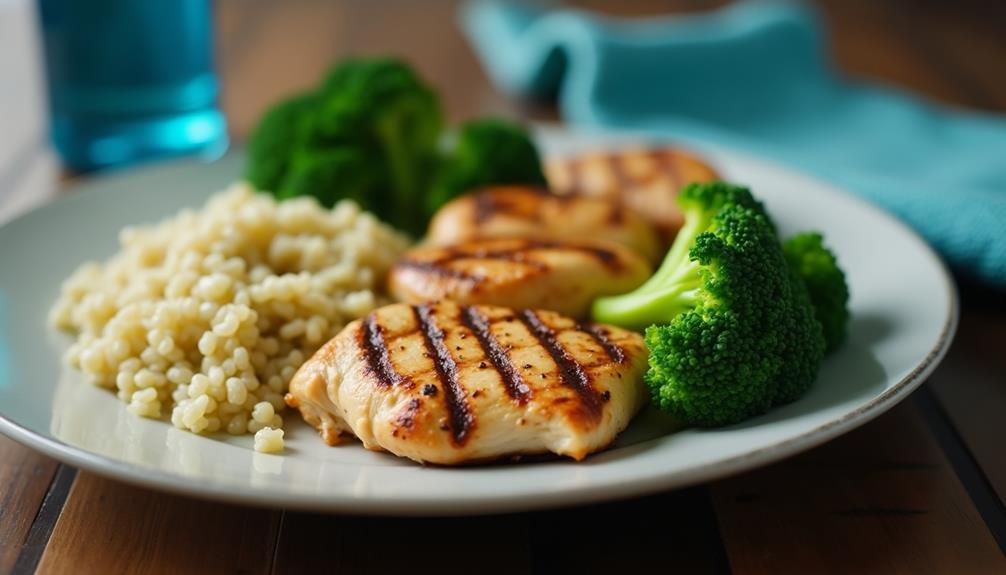
After a workout, understanding your protein needs is essential for effective recovery and muscle growth. Protein plays a pivotal role in repairing and rebuilding muscle fibers that get damaged during exercise. To optimize recovery, aim for about 20 to 30 grams of high-quality protein within 30 minutes to two hours post-workout. Combining protein with carbohydrate powders can enhance nutrient absorption and replenish glycogen stores, further supporting your recovery process.
This amount helps stimulate muscle protein synthesis, vital for growth. Consider sources like lean meats, dairy, or plant-based options such as legumes and tofu.
If you're exercising intensely or frequently, you might need more protein, up to 1.2 to 2.0 grams per kilogram of body weight daily. Pay attention to your body's signals—if you're feeling fatigued or not recovering well, it may be time to reassess your intake.
Role of Carbohydrates
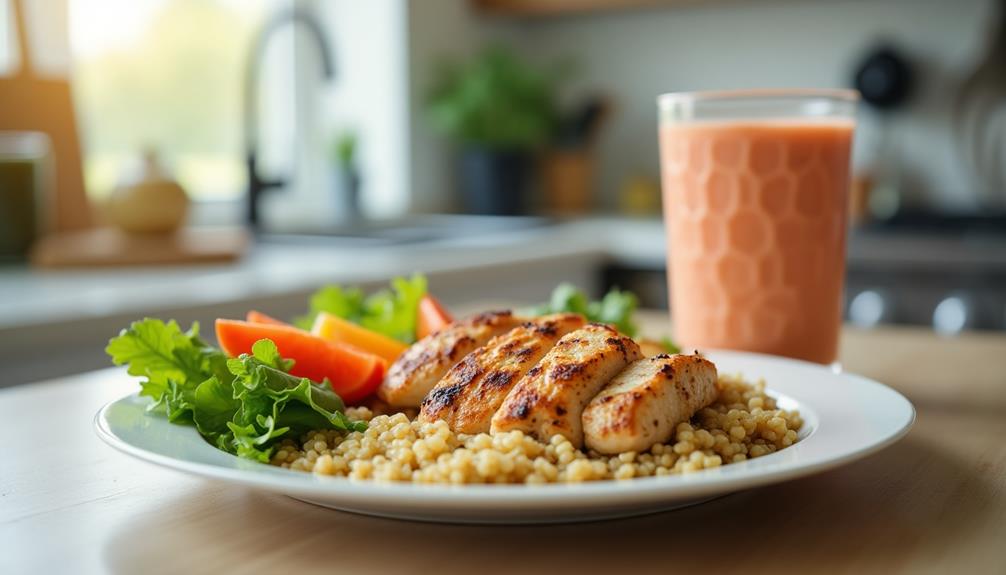
Incorporating carbohydrates post-workout helps restore these glycogen levels, allowing you to bounce back faster for your next session. For the best recovery, consider using high-carb powders specifically designed to replenish energy stores quickly and efficiently. These products can be particularly beneficial for athletes engaged in intense training regimens. Additionally, pairing carbohydrates with protein can enhance muscle repair and growth. This synergy not only aids recovery but can also improve your overall performance in future workouts. Remember, choosing the most suitable types of carbs, like whole grains or fruits, can make a significant difference in your recovery process.
Timing Your Nutrients
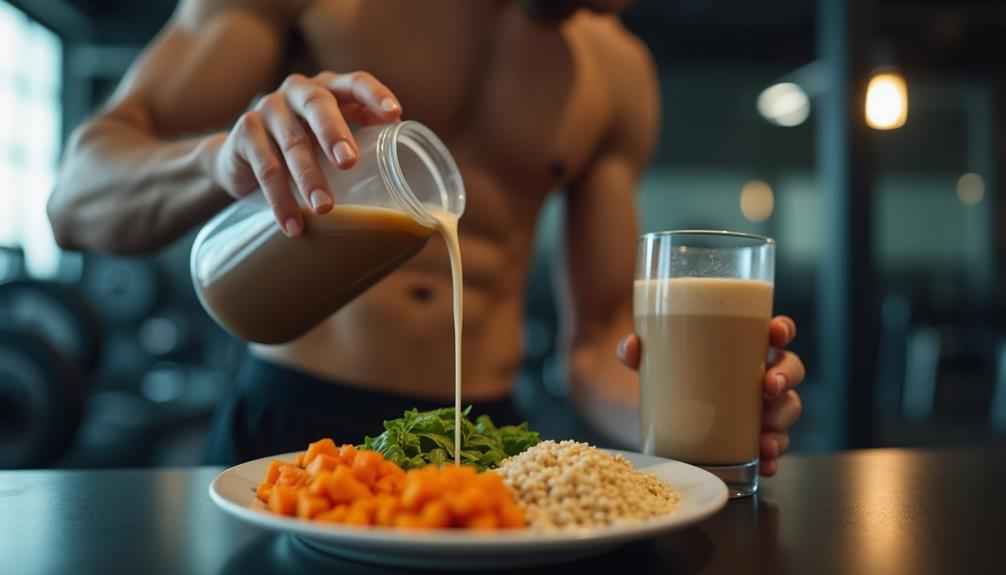
Restoring glycogen levels with carbohydrates is just the first step in optimizing your recovery. You should aim to consume carbs within 30 to 60 minutes after your workout. This timeframe takes advantage of your body's heightened insulin sensitivity, allowing for better glycogen replenishment.
Next, don't forget about protein. Consuming protein alongside carbs aids in muscle repair and growth. Aim for about 10 to 20 grams of protein in that post-workout window.
Ideal Post-Workout Foods
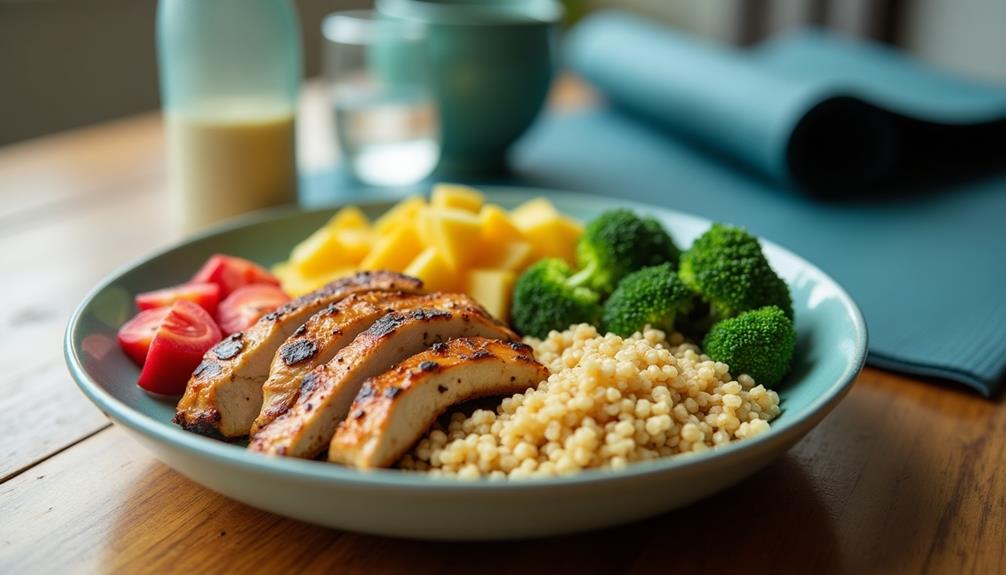
Choosing the appropriate post-exercise foods can greatly enhance your recovery and performance. After working out, your body craves nutrients to repair muscles and replenish energy. Here are some ideal post-workout foods to contemplate:
- Greek Yogurt with Fruit: Loaded with protein and carbohydrates, it helps with muscle recovery and refuels your body.
- Quinoa Salad: This whole grain provides essential amino acids and complex carbs, supporting sustained energy.
- Protein Shake: A quick and convenient option, it delivers the necessary protein to kickstart recovery.
Incorporating these foods into your post-workout routine ensures you're providing your body what it needs to recover efficiently. Remember, the right nutrition can make a significant difference in how you feel and perform in your next workout.
Common Mistakes to Avoid
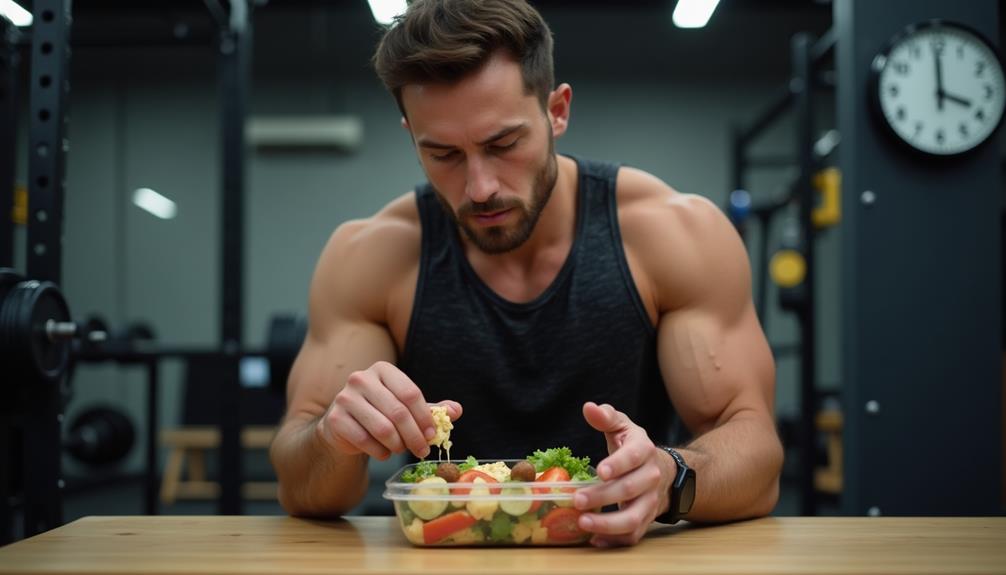
After a grueling workout, it's easy to make some common mistakes that can hinder your recovery and overall progress. One mistake is skipping your post-workout meal. Your body needs fuel to recover and rebuild; delaying this can slow your progress.
Another error is focusing solely on protein. While protein is essential, carbs are equally important for replenishing glycogen stores.
You might also overlook hydration. Dehydration can impair recovery, so make sure you drink enough water after your workout.
Lastly, avoid consuming overly processed foods. They may lack the nutrients your body truly needs.
Individual Factors to Consider

Understanding your individual factors can greatly impact how you approach post-workout nutrition. Everyone's body responds differently based on various aspects, and recognizing these can help you optimize your recovery. Here are some key factors to take into account:
- Fitness Goals: Are you aiming to build muscle, lose weight, or improve endurance? Your goals will determine your protein and carb needs.
- Body Composition: Your current muscle mass and body fat percentage can influence how much protein and carbs you should intake.
- Workout Intensity: The type and intensity of your workouts can impact your recovery requirements. Higher intensity often requires more nutrients.
Creating a Post-Workout Plan

Crafting an effective post-workout plan requires a clear focus on your nutritional needs and recovery timeline. Start by determining your protein and carbohydrate targets. Aim for a protein source, like a shake or chicken, within 30 minutes of finishing your workout. This helps kickstart muscle recovery.
Next, include carbs to replenish glycogen stores. Think about whole grains, fruits, or starchy vegetables. Ideally, you should eat these within two hours post-workout.
Don't forget hydration. Replenish fluids lost during exercise to maintain peak performance.
Frequently Asked Questions
Can I Consume Protein and Carbs Before My Workout Instead?
Absolutely, you can consume protein and carbs before your workout! It'll provide your body with the necessary energy and nutrients, helping you perform better and recover faster. Just be mindful of timing and portion sizes.
How Do Supplements Affect Protein and Carb Timing?
Supplements can enhance your protein and carb timing by providing quick nutrients. If you take them before or after workouts, they'll help optimize recovery and muscle growth, ensuring you get the most out of your efforts.
What if I Can't Eat Immediately After Exercising?
When life gives you lemons, you make lemonade. If you can't eat immediately after exercising, grab a protein shake or snack within an hour. Your body still needs nutrients to recover and rebuild effectively.
Are There Specific Foods to Avoid Post-Workout?
After your workout, it's ideal to avoid sugary snacks, heavy fats, and processed foods. These can hinder recovery and energy replenishment. Focus on whole foods for peak results instead. You'll feel better and recover faster!
How Does Hydration Influence Post-Workout Nutrition?
Imagine your body as a sponge, thirsty for hydration. When you hydrate post-workout, you amplify nutrient absorption, fueling muscle recovery and performance. Without water, your efforts might as well be a whisper lost in the wind.

